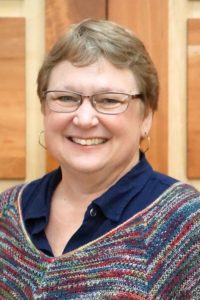 Bonnie Miller is on the board of directors for Anabaptist Disabilities Network. She has worked as an educator for much of her career, including as a public school special education teacher for the past 12 years. Bonnie is also familiar with advocacy for persons with disabilities by raising a now-adult son who has cerebral palsy. She attends Waterford Mennonite Church, Goshen, Indiana.
Bonnie Miller is on the board of directors for Anabaptist Disabilities Network. She has worked as an educator for much of her career, including as a public school special education teacher for the past 12 years. Bonnie is also familiar with advocacy for persons with disabilities by raising a now-adult son who has cerebral palsy. She attends Waterford Mennonite Church, Goshen, Indiana.
______________________
Mennonite Church USA’s proposed Accessibility Resolution is long overdue. As a body of believers seeking to passionately follow Christ’s teachings and example of justice for those who are marginalized, we have formally done nothing to create spaces of belonging for folks in our congregations with disabilities. I have frequently looked around congregations and wondered, “Where are those with disabilities? Where are their families?”
Statistics show that one in four adults in the United States live with some type of disability. Studies also show that the percentage of those with disabilities who see their faith as important is similar to that of the general population. Yet, numerous studies have shown that those with disabilities are less likely to attend religious services than those without disabilities. This pattern has been interpreted to mean that lower participation in worship by persons with disabilities is not caused by a lack of interest, but by the physical, communicative and attitudinal barriers they face.
This resolution is personal, as our son was born with a disability nearly 29 years ago. We were fortunate in that we belonged to a congregation that was generally pro-active, open-minded and informed about making church doable for Tony. Not all churches possess such open-mindedness, nor do they have members trained in areas such as education and health care to speak into disability needs. Thus, there is definite need for a support group to be available for guidance and assistance when congregants are unable to do so or to offer guidance and support.
As Mennonites, we treasure all of God’s children. But do we practice that? Do our attitudes and the buildings we gather in reflect that? Our experience says “no.” Many churches do not meet the Americans with Disabilities Act guidelines with which other public buildings must comply. It’s particularly noteworthy that in many churches, one of the least accessible parts of the building is the place where people most have a voice – the platform in the sanctuary. I’m thankful that after more than 25 years of longing, our congregation added a ramp to the platform in the past several years.
But that only addresses physical needs. What about full emotional inclusion? What about that basic, deep need to belonging to a significant group? There are few things a parent wants more for their children — there are few things any of us wants more for ourselves. “Belonging and love” are identified by renowned psychologist Abraham Maslow as basic psychological needs — immediately after physiological and safety needs.
Belonging and love are needed to build esteem and cognitive skills. Yet those with disabilities are frequently only tolerated, socially, for short periods of time rather than being fully included. Can we practice skills of patience and understanding in order to appreciate those that may be socially awkward in ways that are nearly impossible to change? Our 28-year-old son can count on one hand how many people outside his family he considers true friends. As parents, we praise the Lord and shed happy tears frequently for those few!
I am a lifelong Mennonite and love claiming this denomination as my own. Yet my heart aches very frequently when I see the times when we have missed opportunities to reach out to the broad spectrum of needs among all of God’s children, including those with disabilities. We as a family know that God loves each one of us as we have been created, but, once we step out the doors of our homes, it is often difficult to find that attitude reflected elsewhere. Too often, that has included in our churches.
Please join us in taking baby steps of thinking about the stigmas and biases we possess when it comes to relating to individuals with a disability. Join us in taking time to truly get to know someone with a disability in order to understand needs, barriers, hopes, etc. It’s up to the church to create a more welcoming and hopeful place of belonging for those with disabilities.

